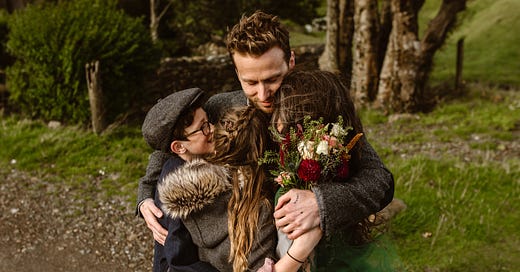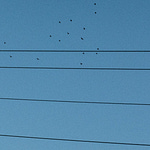I’ve been doing this job for a decade now, and I still have no idea how I’d define my actual job description if ever asked. Step-Dad. I know the title, know it well as I’ve been called it for ten years, but when I try to ascertain the actual requirements of my position, I struggle, as the ephemerality of each actual role seems to make it impossible to stick down. It all depends, I guess I’d say, depends on Sarah, on her availability, on her energy, it depends on the kids and the current phases they find themselves in as they navigate their way through the ever turbulent and winding teenage years, and it depends on me. A lot of it depends on me, as my Autism makes being a step-parent extremely challenging, and I would love sometime to find true numbers about how many people on the Autism Spectrum end up being parents. I imagine the numbers are low as one study I found suggested that only about 5% of all Autistic adults will ever be married. Nevertheless, I do my damn best, and I’ve been thinking a lot about what my actual role is in this whole strange smorgasbord that is a family with two sets of parents, multiple grandparents on both sides, and the strangeness that comes when you’re supposed to act like a parent, you’re supposed to adopt the responsibilities like a parent, but then you’re not always seen as possessing the authority of one.
After last week’s post elicited quite the response, this got me thinking even more about all this, and after hearing from so many of you it made me realize something pretty profound that made me look back over these last ten years, that made me look forward to ten more. I think I know now what the role of the step-parent is, I think I know what my role is, and maybe always has been:
My job is to instill the Instinct to be kind.
I threw Instinct into slanty italic letters for a reason, and that reason is simple. There’s a massive difference, a canyon-sized divide between acting kind, between even being kind, and the instinct to be kind. I believe this. I always have.
Kindness is a practicable art, hell, my entire post last week was about precisely this. It’s something that as we get older we can put in work towards, it’s something that can be improved upon. As we grow, as we learn the shape of the things this life, this planet, this human race, will throw at us, I believe it’s our reaction to them that determines our characters. Kindness, is the cornerstone of this. Not niceness, and again, read last week’s article for my very clear views on the difference between niceness and kindness, but true, deep seated, honest, authentic, and—this might be the most important distinction—effortless, instinctual kindness.
This is the kind that comes naturally, that rises first, that becomes the default reaction to a situation instead of the one that is strived for and practiced to attain. Here’s the thing, instinctual kindness, despite what anyone else might tell you, is HARD. It goes counter to what’s become the norm in our society, a society that prizes cynicism and caution, suspicion and ambivalence, and this is why as we grow older we must practice and try and try and try to be kinder people. What then, if when we were in our most shapeable years, our most formative, we were shown this instinct? What if we had a guide that could help teach us the way to cementing it in the foundations of us?
Perhaps this is the job, perhaps this is the true role of a step-parent as so often they do not carry the burdens, at least not as often, not as many, as the biological parents or the primary guardians in other cases? I’ve seen the difference between our roles, Sarah and I, and I know what she carries, though I know not what the weight feels like in my arms. I know she carries the burden of constant worry, of trying her best to balance between friendship and parental figure, of co-parenting with her ex and his new wife, I know she feels pangs of jealousy, of sadness at time missed that I don’t as pointedly, and I know she feels that seeping feeling of inadequacy that is never earned or deserved, but always present. I am not burdened with these, not really, not the same, and as such I have a freedom in my role she doesn’t, though it often doesn’t feel like it.
Being a step-parent is hard, and I won’t let anyone else convince me otherwise. While she carries things unimaginably and arguably harder in many ways, those who are or who have been in the strange role of step-parent, of extra guardian, know what I speak of. We’re required the full measure of responsibility, with a fraction of the power, we’re passengers in the decisions the other must make, and often with the person they had the kids with in the past. We’re mostly not called “Dad” or “Mom” but our names, and some of us will spend our lifetimes never hearing those words called out in our direction, and we constantly walk the razor’s edge of being either too much a friend and thus making the job of the other parent harder, or too much a parent, and making your own life harder by upsetting the kids you’re trying your best to be a proper guardian to. We’re expected to show up at all the things, but our role is that of a supporting nature and always will be. It’s as if we’re in all the movies, but we’re never the star, only the character actor that makes the A-lister truly shine. This is ok, of course it is, but it’s dishonest to say it’s not hard sometimes, or that it’s not hard a lot.
It’s in this supporting role that we can truly make a difference though, and I think that gets lost by many. Some of the greatest films, the greatest stories, are only made so because of the lessons imparted by the secondary character. What would Frodo be without Samwise Gamgee? What is Butch Cassidy without his Sundance Kid? The examples are plentiful, the lessons enduring, and it’s up to us if we’re to be a forgotten second character, relegating ourselves to the extras that fumble around in the background of each scene we’re in, or those that make a difference, those that have fewer lines, but punch you in the guts with the beauty and truth we’re uttering out.
I don’t know the best or most effective methods sometimes in uttering out these truths, but I know I try. I know I can get frustrated when it seems that those lessons get ignored, when the instincts I’m trying to help them see, to absorb, but there’s motivation in our pursuits when we believe in them, when we know the value they’ll add. So we press on, so we try our very best to model the behavior we wish to become intrinsic. We do this by how we treat the one they look up to, the parent they know to be the headliner in the concert of their youth, how we behave to them, to those around us, how we navigate our way around the house we share.
The instinct to be kind, the Pavlovian response that we never even have to practice, it’s so burned into our beings, this is what it is in the end. This is the goal, the aim. We do this by modeling to them what love should look like in a relationship, especially given circumstances that can, for many, mean they weren’t given that in their first example. You’re a step-parent, after all, so for many step-parents you will be the first and best example of what love can, and should look like. You’re the chance to see what might have been missing, the kissing, the hand-holding, the complete and total adoration of their mom, or dad, or whomever is their primary guardian. In this, swirling around it and giving it its strength, its aroma, its potency, is that aforementioned instinct to be kind, to put others before yourself when it is healthy and acceptable to do so, and to understand the unbelievably beautiful consequences of authentically delivered kindness.
Based on your reactions last week, I know this is an area we all agree on, we all so desperately wish to improve upon, and know of its inherent value. I hadn’t truly put two and two together to understand the importance of its modeling until recently, and I felt it worthy to discuss here. We’re a world that’s spent so much time worrying about the future to come over the last few years and decades, inundated with climate change, pandemics, political divide, and fears surrounding technology, A.I., and social media use in our children, that it really did re-dawn on me that the only way to help safeguard that future is to become the changes we wish to see, just like I said last week, just like Gandhi said so many years before.
If we can plant that seed, if we can Leo DiCaprio Inception style plant this seed in the minds of our youths, what could change? We’re becoming islands at an alarming rate, both from rising sea levels on a literal level, and metaphorically with our increased isolation from our reliance on our own personal tech devices, and the more this occurs, the further away that instinct of kindness drifts. All parents, everywhere, can throw sandbags at the rising tides by helping instill this, and as step-parents, those who are not quite as burdened in quite as few many ways, that job is paramount.
Show them, teach them, help them find the joy that comes when kindness is the instinct, not the aim.
Kindness, my friends, is the job.
To make it instinct,
to make it second nature.
Kindness is the job.















Share this post